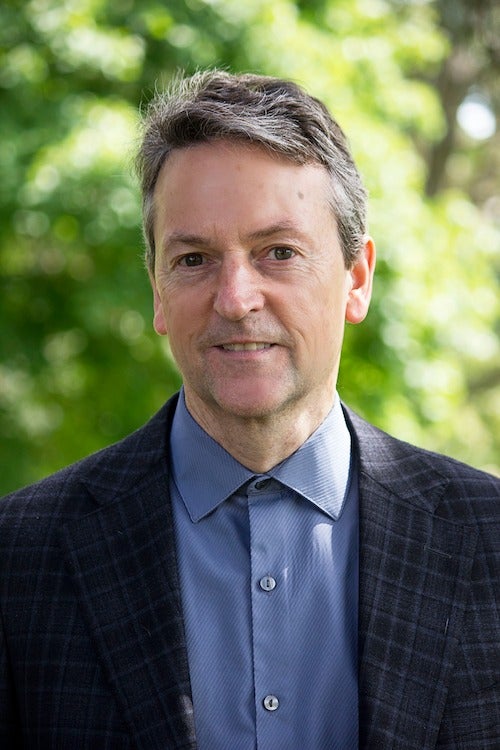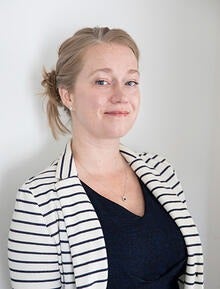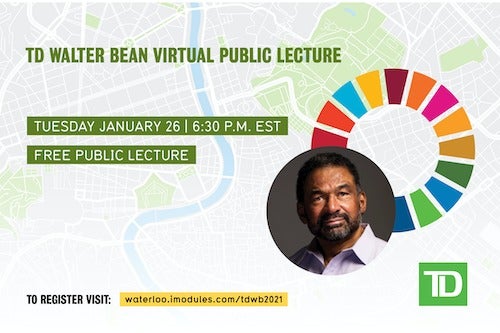Editor:
Brandon Sweet
University Communications
bulletin@uwaterloo.ca
Online campus memorial for Pearl Sullivan today

Today the University community will remember and celebrate Pearl Sullivan, former dean of engineering.
University of Waterloo students, faculty and staff are invited to join the virtual Celebration of Life as we reflect on and celebrate Pearl Sullivan’s life and share memories from her time at the University with special remarks from members of our community.
A champion for Waterloo and for Engineering, Professor Sullivan made an incredible impact on the University of Waterloo, our people and partners during her service as a professor, department chair and dean as shown by the continued outpouring of support and tributes from her students, colleagues and members of the community.
Speakers at the event include:
- President Feridun Hamdullahpur;
- Dean of Engineering Mary Wells;
- Vice-President, Academic & Provost Jim Rush; and
- Former Engineering Society President Abdullah Barakat.
A capella group The Water Boys will be providing music.
The online ceremony takes place today from 11:30 a.m. to 12 noon on YouTube Live.
An update on the staff performance appraisal system review
A message from Marilyn Thompson, associate provost, human resources and chair of the President's Advisory Committee on Staff Compensation (PACSC).
To fulfill the commitment from the May 1, 2018 to April 30, 2021 Staff compensation agreement, the University engaged Mercer, a human resources consulting firm, to conduct a full and comprehensive review of the Staff Performance Appraisal (PA) system. The scope of the review included assessing the effectiveness of the current system and identifying opportunities for improvement based on participant feedback, as well as trends and best practices in performance management in the higher education sector.
The Provost's Advisory Committee on Staff Compensation (PACSC) received four reports from Mercer during Fall 2020. In total, Mercer collected feedback from over 20 per cent of employees who are involved with the Staff Performance Appraisal process, with representation across all segments of the population, including staff employees and managers of staff within faculties, academic support units, and ancillary units. Throughout each segment, the consistent feedback and insights were collected through focus group participation or questionnaire completion.
Outcomes of Mercer’s current state assessment including key themes, areas of opportunity, and recommendations were presented to the PACSC in December. We are now in the process of evaluating where to focus our efforts in 2021 and beyond.
On behalf of the PACSC, I would like to thank everyone who participated in the review. Your feedback and participation was extremely valuable and critical in this review. We will provide a more detailed update once decisions have been made.
If you have any questions about the project, please contact Raghda Sabry, Project Manager or members of the PACSC. If you have any questions about this year's Staff performance appraisal process, please contact your HR Partner.
St. Paul's appoints Richard Myers to a second term as principal
A message from St. Paul's University College. This article was originally featured on the St. Paul's website.

The Board of Governors at St. Paul’s University College has reappointed Richard Myers as principal of the College for a second term, beginning July 1, 2021. He will serve in the role until June 30, 2026.
“We are so pleased to have Rick continue his role as principal,” said Board Chair Brad Siim. “He brings a great deal of passion and expertise to our College community. We look forward to supporting his efforts to develop the institution over the next five years.”
Myers was appointed as principal in July 2016. In his first term, he focused his efforts on raising the academic profile of the institution, enhancing the undergraduate residence facilities and improving the College’s governance infrastructure. This has included expanding academic programming to provide more extensive course offerings in Religious Studies, Canadian Studies, Indigenous Studies and Human Rights, as well as giving the residence facilities an upgrade. A student association, academic council and an alumni advisory have been developed to support improved governance.
“I truly enjoy working at St. Paul’s and am delighted to continue in my role for a second term,” said Myers. “The College has a great mission and wonderful combination of academics and student life, all brought together in a meaningful way because of the small scale of the place.”
Heading into his second term, Myers is excited to develop a unique program in Indigenous Entrepreneurship. It will begin with a pilot of its experiential components this February, with plans to launch a minor program in the Fall.
“I’m so pleased with how we’ve positioned the College for growth during my first term as principal,” said Myers. “It has set the groundwork for substantial progress in the second term.”
Myers’ reappointment is supported by a recommendation from the College community and was approved by the Board of Governors. The Board consulted with staff, faculty, students, and alumni, as well as key stakeholders across the University of Waterloo.
Myers is a professor of political science. Prior to his role at St. Paul’s, he served as the VP Academic at St. Thomas University and president of Algoma University.
We know Rick’s leadership, experience and passion for our community will continue to benefit the College for years to come. Please join us in congratulating him on his term extension.
Q and A with the experts: Limiting news intake while staying engaged online
The University of Waterloo has a number of experts available for comment on various aspects of the COVID-19 pandemic.

When we can’t be physically close to anyone, social media helps keep us connected. But during these difficult and busy times, social media can also be a mentally exhausting place. Too much news intake can trigger feelings of anxiety and depression.
We asked Professor Shana MacDonald, an expert in social media, to remind us of how to limit our news intake while staying engaged and connected virtually.
How can you stay engaged on social media but at the same time limit your news intake?
Take the time to review who you are following and why. If you feel overwhelmed by the amount of information you encounter in your social media newsfeeds you can either “mute” accounts that post too much and dominate your feed or unfollow
Alongside this, you can add some trusted news sites that adhere to journalistic ethics and standards so that you ensure you are getting the most factual and up-to-date information from verifiable sources.
Is there a “safe” amount of time to spend online reading news and on social media when it comes to your mental health?
The recommended amount is 30 minutes. This may seem quite a limited amount of time given how much we look to social media for entertainment, news, and staying connected. I would recommend people check in with themselves and notice when they begin to get bleary-eyed or anxious – note how much time is their own personal limit and set a timer when deciding to scroll as leisure time.
Other ways to help limit your intake are removing apps from your phone so that you have to actively sign in on a computer to access them – this will stop you from opening an app whenever you have a moment of downtime.
What are the best apps for staying engaged, but not getting overwhelmed?
This can be different for everyone. Some people have developed a supportive community network on Twitter while others find that to be an app full of negative news cycles and in-fighting. It all comes down to how you set up or “curate” your newsfeeds. This will help ensure you find the right balance for you.
Beyond that, signing up for different news media outlets you enjoy – say subscribing to the New York Times or Globe and Mail ensures you have access to just one trusted news source and you can open the app when you want and get caught up.
How can an individual contribute to a more positive online community?
There are two ways:
Ensure you enter into any online conversation with a commitment to respect and care. Do not dive into a debate if you are feeling strong emotions because it risks you being hurt as much as doing harm. Take a break, get some fresh air, drink some water. Decide if your desired response is helping or harming. Make sure you know the rules attached to each group or forum you belong to and adhere to them.
Don’t spread misinformation or heated exchanges with no resolution on your own social media feeds. The internet if full of counterproductive information and debates. Only share what you think is creating positive conversations and spaces to connect – that will help shape the kinds of online environments others see on their news feeds.
Professor Shana MacDonald is Associate Professor in Communication Arts and the current President of the Film Studies Association of Canada.
Her SSHRC funded interdisciplinary research is situated between film, media and performance studies, and examines intersectional feminism within social and digital media, popular culture, cinema, performance, and public art. Professor MacDonald is a convenor of the qcollaborative (qLab), a feminist design lab dedicated to developing new forms of relationality through technologies of public performance.
TD Walter Bean lecture and other notes

This is a reminder that the TD Walter Bean Virtual Lecture takes place tonight. Delivering remarks entitled "Just Sustainabilites in Urban Planning, Policy and Practice" is Professor Julian Agyeman, Professor of Urban and Environmental Policy and Planning at Tufts University. The event takes place at 6:30 p.m. There's still time to register.
The Urban Alliance on Race Relations (UARR) Black Youth Space will be running a virtual university fair entitled Preparing for Postsecondary: Universities on Wednesday, January 27 from 5:00 p.m. to 6:00 p.m. Participating institutions include the University of Waterloo, Queen's University, McMaster University, Ryerson University, University of Toronto and York University. Each institution will have a 20-minute presentation window along with a 5-minute Q&A session with workshop participants.
The Black Youth Space is "a space designed to engage Black high school students in programming that supports their personal and educational goals. Students will have the opportunity to participate in workshops to build skills, learn about topics of interest, and socialize with their peers."
The next Noon Hour Concert event takes place tomorrow at 12:30 p.m. Anneli Loepp Thiessen presents a lecture recital entitled Still Singing - Women Composers and the "Voices Together" Hymnal on the new Voices Together Hymnal, which includes many female composers and writers.

Anneli Loepp Thiessen is a PhD student in the Interdisciplinary Music Research program at the University of Ottawa where she studies gender in the contemporary worship music industry. She holds her Master of Music in Piano Performance from the University of Ottawa, a Graduate Diploma in Arts Management from Queens University, and her ARCT diploma in Piano Performance from the Royal Conservatory of Music.
As a member of the Mennonite Song and Worship Committee, she has spent the past four years helping to choose hymns for the new "Voices Together" Hymnal. Sifting through over 10,000 pieces of music, the committee chose 775 finalists.
Link of the day
When and Where to get support
Students can visit the Student Success Office online for supports including academic development, international student resources, leadership development, exchange and study abroad, and opportunities to get involved.
Instructors can visit the Keep Learning website to get support on adapting their teaching and learning plans for an online environment.
Updated Course templates are now available within your course in LEARN to help you build and edit your content and assignment pages quickly. Support for Winter 2021 is available.
The following workshops, webinars, and events are offered by the KL team (CTE, CEL, ITMS, LIB):
Independent Remote Course Design Essentials. Self-directed, continuous self-enrollment course in LEARN.
Getting Ready to Facilitate Online Courses: TA Training, Monday, January 18, 2021, 8:30 a.m. to Friday, February 12, 4:30 p.m.
Microsoft OneNote - Class Notebooks, Wednesday, January 27, 1:30 p.m. to 2:30 p.m. Wednesday, February 3, 1:00 p.m. to 2:00 p.m. Please note the new date and time.
Introduction to PebblePlus (CTE7527), Thursday, January 28, 9:30 a.m. to 11:30 a.m.
Employees can access resources to help them work remotely, including managing University records and privacy of personal information. Here are some tips for staying healthy while working from home.
Stay informed about COVID cases on campus by consulting the COVID case tracker.
Whether you’re a student or faculty member, the Writing and Communication Centrehas virtual services and programs to help you with all of your academic writing needs. This term we have added evening and weekend one-to-one appointments with our peer tutors, and our NEW one-to-one workshops, where you can learn the content directly from one of our writing advisors.
- Undergraduates: Work with us to brainstorm, draft, revise, and polish your assignments in one-to-one appointments. Ask questions and learn writing tips at our Instagram Live Q&A sessions, and beat isolation while improving your writing skills at the weekly PJ-friendly writing groups.
- Graduates: Meet with our advisors in one-to-one appointments. Join the online writing community at the Virtual Writing Cafés, learn how to present your work at Speak Like a Scholar, or get moving on your dissertation at Dissertation Boot Camp.
- Faculty and Instructors: Request custom workshops for your courses, join the Waterloo writing community at the Virtual Writing Cafés, or make progress on your article, book, or chapter in one-to-one meetings with our faculty specialist.
We understand that these circumstances can be troubling, and you may need to speak with someone for emotional support. Good2Talk is a post-secondary student helpline based in Ontario, Canada that is available to all students. If you feel overwhelmed or anxious and need to talk to somebody, please contact the University’s Campus Wellness services, either Health Services or Counselling Services. You can also contact the University's Centre for Mental Health Research and Treatment.
The Library has published a resource guide on how to avoid information overload.
The Faculty Association of the University of Waterloo (FAUW) continues to advocate for its members. Check out the FAUW blog for more information.
The University of Waterloo Staff Association (UWSA) continues to advocate for its members. Check out the UWSA blog for more information.
The Indigenous Initiatives Office is a central hub that provides guidance, support, and resources to all Indigenous and non-Indigenous campus community members and oversees the university Indigenization strategy.
WUSA supports for students:
Food Support Service food hampers are currently available from the Turnkey Desk on weekdays from 7:30 a.m. to 7:00 p.m. in the Student Life Centre. If you have any questions please email us at foodsupport@wusa.ca.
Centre for Academic Policy Support - CAPS is here to assist Waterloo undergraduates throughout their experience in navigating academic policy in the instances of filing petitions, grievances and appeals. Please contact them at caps@wusa.ca. More information at https://wusa.ca/services/centre-academic-policy-support-caps.
WUSA Commissioners who can help in a variety of areas that students may be experiencing during this time:
- Equity – equity@wusa.ca
- Co-op and Experiential Affairs – coop.affairs@wusa.ca
WUSA Student Legal Protection Program- Seeking legal counsel can be intimidating, especially if it’s your first time facing a legal issue. The legal assistance helpline provides quick access to legal advice in any area of law, including criminal. Just call 1-833-202-4571.
Empower Me is a confidential mental health and wellness service that connects students with qualified counsellors 24/7. They can be reached at 1-833-628-5589.
When and Where (but mostly when)
Healthy Warriors at Home. Free programming including Online Fitness, Health Webinars, Personalized Nutrition and more from Warriors Athletics and Rec. Open to students, staff, faculty and alumni. Register today.
Renison English Language Institute continues to offer virtual events and workshops to help students practice their English language skills.
Warriors vs. Laurier Blood Donation Battle. Join your fellow Warriors, donate blood and help us win the Blood Battle against Laurier for a second year in a row. Set up a profile or add the PFL code: UNIV960995 to your account if you have a blood.ca account already. Questions? Contact WarriorsInfo@uwaterloo.ca.
Warrior Rec Free Programs for Students, January to February.Wide range of free opportunities available to keep students active and healthy including:Fitness Classes (On-Demand), Health and Mindfulness Webinars, Personalized Nutrition Guides, Personal Training Consultations, Small Group Training and Warrior Reset. Register today.
Drop-in to Warrior Virtual Study Halls on Wednesdays from 5:30 p.m. to 7:00 p.m. Come together in this virtual space to set goals and work independently or in groups each week.
Warriors truLOCAL Kickback Program, January 20 to February 20. Support your Warriors varsity teams by purchasing a pre-set truLOCAL box filled with the best quality locally sourced meat and fish. Find out more information and purchase a box today.
Virtual Celebration of Life for Pearl Sullivan, Tuesday, January 26, 11:30 a.m.
Centre for Career Action presents Building Upon Our Resilience: Practical Mindfulness and Wellness Strategies for Challenging Times, Tuesday, January 26, 12 noon to 1:00 p.m. Register on WaterlooWorks (under Career Centre Events).
Concept Working Session: Building an Entrepreneurial Mindset, Tuesday, January 26, 5:30 p.m., virtual event.
2021 TD Walter Bean Professorship in Environment, "Just Sustainabilities in Urban Planning, Policy and Practice," Tuesday, January 26, 6:30 p.m. to 8:00 p.m.
QPR Mental Health Training for Students, Wednesday, January 27, 9:30 a.m.
Applying for tenure workshop, Wednesday, January 27, 10:30 a.m.
Rewiring for Happiness Consultation Group, Wednesday, January 27, 10:30 a.m.
Noon Hour Concert: Still Singing, Wednesday, January 27, 12:30 p.m. Anneli Loepp Thiessen presents a lecture recital on the new Voices Together Hymnal, which includes many female composers and writers. Free event, online.
Toxic Algal Blooms – Implications of Climate Change on Frequency and Prevention in Water Systems, Wednesday, January 27, 1:00 p.m. to 2:00 p.m.
Concept Intro Session: What's Your Problem? Wednesday, January 27, 6:00 p.m., virtual event.
Bell Let’s Talk Day, Thursday, January 28. Join your fellow Warriors and nearly 200 other universities and colleges across Canada to participate in the world’s largest mental health conversation. Now more then ever, every action counts. Find out how you can be involved.
Rewiring for Happiness Consultation Group, Thursday, January 28, 1:30 p.m.
NEW - WaterTalk: The controls of surface water-groundwater connectivity in a critical zone context, presented by Professor Kamini Singha, Thursday, January 28, 2:00 p.m. to 3:00 p.m.
Grad Student Community and Conversation Circle, Thursday, January 28, 3:30 p.m. to 4:30 p.m.
NEW - The Good, the Bad and the Weird: Talkin' about Viruses with Professor Jozef Nissimov, part of the Faculty of Science’s New Faculty Lecture Series, Thursday January 28, 7:00 p.m.
New faculty information session, Friday, January 29, 10:00 a.m.